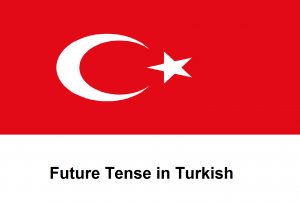Difference between revisions of "Language/Turkish/Grammar/Future-Tense"
| Line 14: | Line 14: | ||
__TOC__ | __TOC__ | ||
There are many ways to express future in Turkish but generally, we use -ecek/-acak paragoge’s. | There are many ways to express future in Turkish but generally, we use -ecek/-acak paragoge’s. For example, the present form of a sentence would be "Plan yaparım" but if you want to say that sentence in the future form, then it would be "Plan yapacağım." | ||
Turkish is also like the other europan language about the conjugations. | Turkish is also like the other europan language about the conjugations. | ||
| Line 22: | Line 22: | ||
First of all you should take the verb stem and then you should put the future addition. | First of all you should take the verb stem and then you should put the future addition. | ||
You can | You can form the future tense in Turkish with the <code>-ecek and <code>-acak additions. | ||
For example | For example, you should start with the verb "love" (sevmek). The verb stem is <code>sev-". The future addition is first singular is <code>-eceğim. | ||
Now, we add the this addition to verb stem. sev + eceğim. | Now, we add the this addition to verb stem. <code>sev + eceğim. | ||
I will always love you ( Seni daima seveceğim). | I will always love you (Seni daima seveceğim). You must not say "I" (ben) because you are already expressing "I" with the addition <code>-ecek". | ||
Only if you want to make an emphasis, you can add the first pronoun "I" (ben). | |||
It works the same as the other European languages. | |||
For example if you want to say | For example if you want to say "I love you" in Italian you should say "ti amo". | ||
The verb is amare and the verb stem is -am. first singular addition is | The verb is <code>amare and the verb stem is <code>-am. The first singular addition is <code>-o". Namely the full sentence is "amo". This is the same in Turkish. | ||
How I am going to explain the future additions (gelecek zaman ekleri). | |||
== '''PRONOUNS + VERB + (ECEK / ACAK) / PRONOME + VERBO + (ECEK / ACAK)''' == | == '''PRONOUNS + VERB + (ECEK / ACAK) / PRONOME + VERBO + (ECEK / ACAK)''' == | ||
{| class="wikitable" | {| class="wikitable" | ||
Revision as of 14:13, 16 May 2022
Merhaba everybody,
In today's lesson you will learn some useful vocabulary about ¨FUTURE TENSE¨ in Turkish.
Happy learning! :)
There are many ways to express future in Turkish but generally, we use -ecek/-acak paragoge’s. For example, the present form of a sentence would be "Plan yaparım" but if you want to say that sentence in the future form, then it would be "Plan yapacağım."
Turkish is also like the other europan language about the conjugations.
First of all you should take the verb stem and then you should put the future addition.
You can form the future tense in Turkish with the -ecek and -acak additions.
For example, you should start with the verb "love" (sevmek). The verb stem is sev-". The future addition is first singular is -eceğim.
Now, we add the this addition to verb stem. sev + eceğim.
I will always love you (Seni daima seveceğim). You must not say "I" (ben) because you are already expressing "I" with the addition -ecek".
Only if you want to make an emphasis, you can add the first pronoun "I" (ben).
It works the same as the other European languages.
For example if you want to say "I love you" in Italian you should say "ti amo".
The verb is amare and the verb stem is -am. The first singular addition is -o". Namely the full sentence is "amo". This is the same in Turkish.
How I am going to explain the future additions (gelecek zaman ekleri).
PRONOUNS + VERB + (ECEK / ACAK) / PRONOME + VERBO + (ECEK / ACAK)
PRONOUNS
PRONOUNS
ben
-eceğim
I
will
sen
-eceksin
you
will
o
-ecek
he/she/it
will
biz
-eceğiz
we
will
siz
-eceksiniz
you
will
onlar
-ecekler
they
will
PRONOUNS + VERB + "ECEK, ACAK" .
- Ben geleceğim: I will come
- Sen geleceksin: you will come
Examples
ENGLISH
TURKISH
PRONUNCIATION ENGLISH
I WILL COME
BEN GELECEĞİM
behn geh leh jeh eh ihm
YOU WILL COME
SEN GELECEKSİN
sehn geh leh jehk sihn
HE / SHE / IT
WILL COME
O GELECEK
oh geh leh jehk
WE WILL COME
BİZ GELECEĞİZ
bihz geh leh jeh eh ihz
YOU WILL COME
SİZ GELECEKSİNİZ
sihz geh leh jehk sih nihz
THEY
WILL COME
ONLAR
GELECEKLER
ohn lahr
geh leh jehk lehr
I WILL COME
HOME
BEN EVE
GELECEĞİM
behn eh veh
geh leh jeh eh ihm
YOU WILL COME
HOME
SEN EVE
GELECEKSİN
sehn eh veh
geh leh jehk sihn
HE WILL COME
HOME
O EVE
GELECEK
oh eh veh
geh leh jehk
WE WILL COME
HOME
BİZ EVE
GELECEĞİZ
bihz eh veh
geh leh jeh eh ihz
YOU WILL COME
HOME
SİZ EVE
GELECEKSİNİZ
sihz eh veh
geh leh jehk sih nihz
THEY WILL
COME HOME
ONLAR EVE
GELECEKLER
ohn lahr
eh veh geh leh jehk lehr
